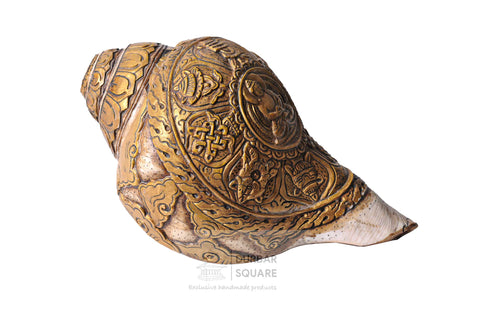The cultural significance of Sankha (conch shell)

Sankha, a conch shell, holds great cultural significance in many ancient civilizations and still continues to be an important symbol in modern times. It is a prevalent object in Hinduism and Buddhism, representing purity, purity of speech, and good luck. The conch shell has been used for religious purposes since ancient times, and its cultural significance is a reflection of the beliefs and values of the civilizations that used it.
The Hindu culture views Sankha as an emblem of Vishnu, the preserver of the universe. In Hindu mythology, the conch shell is seen as a symbol of divine power and strength, and is often depicted being held by Vishnu in his hand. In Hindu tradition, the sound of the conch shell, when blown during religious ceremonies, is said to purify the atmosphere and create a sense of sacredness. This is why the Sankha is considered to be an auspicious symbol in Hinduism, representing purity, power, and good fortune.
In Buddhism, Sankha is seen as a symbol of Buddhist teachings and the way of life. It represents the sound of the Buddhist teachings, which are said to spread across the universe and reach all beings, bringing them enlightenment. The sound of the conch shell is also believed to dispel negativity and bring peace, happiness, and prosperity to all those who hear it.
Sankha is also considered to be a symbol of victory and prosperity. In ancient times, the sound of the conch shell was used to signal the start of a battle, and the victorious army was often greeted with the sound of conch shells as a sign of their victory. This association with victory has made the Sankha a symbol of success and good luck in many cultures.
In Hinduism, Sankha is also associated with the idea of purity of speech. The conch shell is seen as a symbol of the power of words, and the belief is that speaking with a pure and honest heart will bring good karma. This belief is reflected in Hindu scripture, where it is said that a person who speaks with a pure heart will have a voice that is like the sound of the conch shell, clear and pure.
Sankha is also an important symbol in Hindu wedding ceremonies, where it is often used as a ritual object. The sound of the conch shell is said to purify the atmosphere, and the couple is often asked to blow the conch shell to signify their union. This ritual symbolizes the union of two individuals and the purification of their union with the power of the Sankha.
In Buddhism, Sankha is also used in religious ceremonies, such as the initiation of a new monk into the Buddhist order. The new monk is presented with a conch shell, which symbolizes the purity of his speech and the teachings of the Buddha. The sound of the conch shell is said to purify the atmosphere and create a sense of sacredness, making it an important symbol in Buddhist ceremonies.
In modern times, Sankha continues to be an important cultural symbol, especially in Hindu and Buddhist societies. It is often used in religious ceremonies and is considered a symbol of good luck and prosperity. In Hinduism, the conch shell is often used in Hindu wedding ceremonies and is considered an auspicious symbol. In Buddhism, the Sankha is used in initiation ceremonies and is considered a symbol of the Buddhist teachings.
In conclusion, Sankha, the conch shell, holds great cultural significance in many ancient civilizations and continues to be an important symbol in modern times. Its significance is a reflection of the beliefs and values of the civilizations that used it, and it continues to be an important symbol of purity, power, and good.



